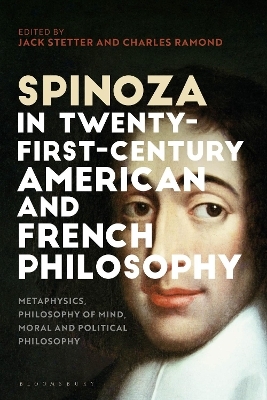
Spinoza in Twenty-First-Century American and French Philosophy
Bloomsbury Academic (Verlag)
978-1-350-41195-1 (ISBN)
Spinoza in Twenty-First-Century American and French Philosophy gives readers a unique opportunity to discover the most consequential and sophisticated aspects of American and French Spinoza research today. Featuring chapters by American scholars with French experts responding to these, the book is structured according to the themes of Spinoza's philosophy, including metaphysics, philosophy of mind, moral philosophy and political philosophy. The contributions consider the full range of Spinoza's philosophy, with chapters addressing not only the Ethics but his lesser-known early works and political works as well. Issues covered include Spinoza's views on substance and mode, his conception of number, his account of generosity as freedom, and many other topics.
Jack Stetter is Visiting Assistant Professor of Philosophy at Loyola University New Orleans, USA. Charles Ramond is Full Professor at the Université Paris 8 Vincennes Saint-Denis, France. He is also Member of the Philosophy Laboratory EA 4008 LLCP and and Director of the International Conference Series Spinoza à Paris 8.
About this Book
About the Authors
Acknowledgements
Abbreviations and Citations
General Introduction
PART I: METAPHYSICS
1. Spinoza’s Metaphysics Revisited, Edwin Curley (University of Michigan Ann Arbor, USA)
A Response: On Spinoza, Possible Worlds, and Pantheism, Pierre-François Moreau (ENS Lyon, France)
2. The Elusiveness of the One and the Many in Spinoza: Substance, Attribute, and Mode, Michael Della Rocca (Yale University, USA)
A Response: In What Way It Exists, Pascal Sévérac (Université Paris-Est Créteil, France)
3. The Earliest Draft of Spinoza’s Ethics, Yitzhak Y. Melamed (Johns Hopkins University, USA)
A Response: Accidents and Modifications: An Additional Note on Axioms 1 and 2 in Appendix 1 of the Short Treatise, Mogens Lærke (Centre National de la Recherche Scientifique, France)
4. Metaphysical Rationalism, Martin Lin (Rutgers, The State University of New Jersey, USA)
A Response: Leibniz’s Principle of (Sufficient) Reason and Principle of Identity of Indiscernibles, Valérie Debuiche (Université d’Aix-Marseille, France)
5. The Transformation of Relations in Spinoza’s Metaphysics, Simon B. Duffy (Yale-NUS College, Singapore)
A Response: Essence, Variations in Power, and “Becoming Other” in Spinoza, Céline Hervet (Université de Picardie Jules Verne, France)
PART II: PHILOSOPHY OF MIND
6. Spinoza’s Two Claims About the Mind-Body Relation, Alison Peterman (University of Rochester, USA)
A Response: A Puzzle in Spinoza’s Views on the Mind-Body Problem, Jack Stetter (Université Paris 8 Vincennes Saint-Denis, France)
7. Spinoza’s True Ideas: Suggestive Convergences, Knox Peden (Australian National University, Australia)
A Response: Althusser, Spinoza, and the Specter of the Cartesian Subject, Pascale Gillot (Université de Tours François Rabelais, France)
8. Spinoza on Beings of Reason [Entia Rationis] and the Analogical Imagination, Michael A. Rosenthal (University of Washington, USA)
A Response: Analogia and Ens Rationis, Jacqueline Lagrée (Université de Rennes, France)
PART III: MORAL PHILOSOPHY
9. Spinoza on Good and Bad, Steven Nadler (University of Wisconsin Madison, USA)
A Response: The Knowledge of Good and Bad, Lorenzo Vinciguerra (Université de Picardie Jules Verne, USA)
10. Generosity as Freedom in Spinoza’s Ethics, Hasana Sharp (McGill University, Canada)
A Response: A Generous Reading, Ariel Suhamy (Collège de France, France)
PART IV: POLITICAL PHILOSOPHY
11. Anthropomorphism, Teleology and Superstition: The Politics of Obedience in Spinoza’s Tractatus Theologico-Politicus, Daniel Garber (Princeton University, USA)
A Response: Logic of the Pious, Logic of the Superstitious, Chantal Jaquet (Université Paris 1 Panthéon-Sorbonne, France)
12. Individual and Community and Its American Legacy, Steve Barbone (San Diego State University, USA)
A Response: Between Matheron and Spinoza, Something Happens…, Laurent Bove (Université de Picardie Jules Verne, France)
13. Spinoza’s Formulation of the Radical Enlightenment’s Two Foundational Concepts: How Much Did He Owe to the Dutch Golden Age Political-Theological Context?, Jonathan Israel (Princeton Institute for Advanced Studies, USA)
A Response: Spinoza’s Paradoxical Radicalism, Charles Ramond (Université Paris 8 Vincennes Saint-Denis, France)
Bibliography
Index Locorum
Index Nominum
| Erscheinungsdatum | 08.03.2023 |
|---|---|
| Verlagsort | London |
| Sprache | englisch |
| Maße | 156 x 234 mm |
| Themenwelt | Geisteswissenschaften ► Philosophie ► Geschichte der Philosophie |
| Geisteswissenschaften ► Philosophie ► Metaphysik / Ontologie | |
| Geisteswissenschaften ► Philosophie ► Philosophie der Neuzeit | |
| Sozialwissenschaften | |
| ISBN-10 | 1-350-41195-7 / 1350411957 |
| ISBN-13 | 978-1-350-41195-1 / 9781350411951 |
| Zustand | Neuware |
| Informationen gemäß Produktsicherheitsverordnung (GPSR) | |
| Haben Sie eine Frage zum Produkt? |
aus dem Bereich


